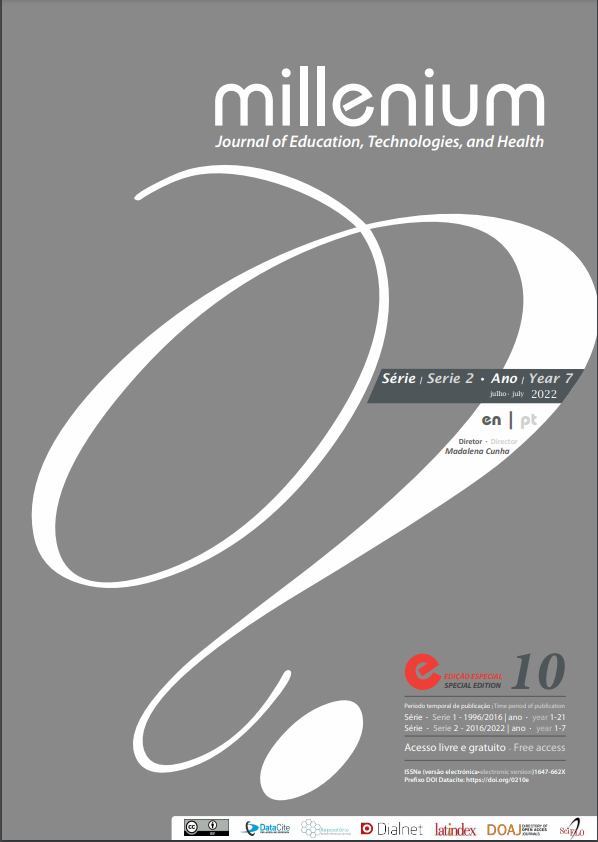Knowledge of the person with Inflammatory Bowel Disease (IBD)
DOI:
https://doi.org/10.29352/mill0210e.26626Keywords:
knowledge, inflammatory bowel disease, therapeutic self-careAbstract
Introduction: The person with chronic disease is challenged to a continuum of adaptation to the new health-illness condition. The lack of knowledge is a barrier to the incorporation of therapeutic regimes, often complex ones, in their daily lives, and nurses play a facilitating role in the transition process
Objetive: Assessing knowledge about the pathology in people with IBD.
Methods: This is a descriptive, correlational and cross-sectional study, with a quantitative approach and convenience sampling. As a data collection method, we used an inventory entitled "Inflammatory Bowel Disease Knowledge (IBD-KNOW)", after translation and adaptation to Portuguese. Data analysis was performed using the SPSS® version 23 operating system.
Results: The average correct response rate to the IBD-KNOW was 57.1%. In the
reproduction" and "function" obtained the lowest values of correct answers, respectively 25.4% and 32.4%. correct answers, respectively 25.4% and 32.4%. There was a strong positive correlation between knowledge of IBD and age at diagnosis (r=0.717, p<0,02), a moderate negative correlation moderate negative correlation between IBD knowledge and education level (r= -0.513, p<0,01) and a weak negative correlation between the degree of knowledge and the age of
people with IBD (r=-0.201, p<0,017). Male persons have lower knowledge about IBD (H=1936, p<0,017), employment status has no influence on the level
of knowledge about IBD (p>0,7).
Conclusion: Most patients do not demonstrate knowledge about IBD, nor do they show adherence behaviors. It is becoming urgent to empower patients for therapeutic self-care with the implementation of the Nursing Consultation
Downloads
References
Beaton, D. E., Bombardier, C., Guillemin,F., & Ferraz, M. B. (2000). Guidelines for the process of cross-cultural adaptation of self-report measures. Spine, 25(24), 3186–3191. https://doi.org/10.1097/00007632-200012150-00014
Cardoso, A. F., Queirós, P., Ribeiro, C. F., & Amaral, A. (2014). Culltural adaptation and psychometric properties of the portuguese version of the terapeutic self-care scale. International Journal of Caring Sciences, 7(2). 426-436. http://www.internationaljournalofcaringsciences.org/docs/10.%20Cardoso-1.pdf
Colombara, F., Martinato, M., Girardin, G., & Gregori, D. (2015). Higher levels of knowledge reduce health care costs in patients with inflammatory bowel disease. Inflammatory Bowel Diseases, 21(3), 615–622. https://doi.org/10.1097/MIB.0000000000000304
Conselho Internacional de Enfermeiros. (2010). Servir a comunidade e garantir a continuidade: Os enfermeiros na vanguarda dos cuidados na doença crónica. Recuperado de: https://www.ordemenfermeiros.pt/noticias/conteudos/die-2010-servir-a-comunidade-e-garantir-qualidade-os-enfermeiros-na-vanguarda-dos-cuidados-na-doen%C3%A7a-cr%C3%B3nica/
Morna, A. C. (2016). Doença inflamatória intestinal de início muito precoce. (Tese de Mestrado, Faculdade de Medicina da Universidade de Lisboa). Recuperado de: https://repositorio.ul.pt/bitstream/10451/25873/1/AnaCNFMorna.pdf
Ng, S. C., Shi, H. Y., Hamidi, N., Underwood, F. E., Tang, W., Benchimol, E. I., Panaccione, R., Ghosh, S., Wu, J., Chan, F., Sung, J., & Kaplan, G. G. (2017). Worldwide incidence and prevalence of inflammatory bowel disease in the 21st century: a systematic review of population-based studies. Lancet, 390(10114), 2769–2778. https://doi.org/10.1016/S0140-6736(17)32448-0
Oliveira, C. A. C. (2015). Autocuidado: Gerir regime medicamentoso: Uma revisão integrativa da literatura contributo para o desenvolvimento de um modelo clínico de dados em enfermagem. (Dissertação de Mestrado. Escola Superior de Enfermagem do Porto. Recuperado de: http://hdl.handle.net/10400.26/10771
Park, J., Yoon, H., Shin, C. M., Park, Y. S., Kim, N., & Lee, D. H. (2020). Higher levels of disease-related knowledge reduce medical acceleration in patients with inflammatory bowel disease. PloS One, 15(6), e0233654. https://doi.org/10.1371/journal.pone.0233654
Santos, A., Ramos, A., & Fonseca, C. (2017). Da formação à prática: Importância das Teorias do Autocuidado no Processo de Enfermagem para a melhoria dos cuidados. Journal of Aging and Inovation, 6, 51
Vernon-Roberts, A., Gearry, R. B., & Day, A. S. (2020). The level of public knowledge about Inflammatory Bowel Disease in Christchurch, New Zealand. Inflammatory intestinal diseases, 5(4), 205–211. https://doi.org/10.1159/000510071
Yoon, H., Yang, S. K., So, H., Lee, K. E., Park, S. H., Jung, S. A., Choh, J. H., Shin, C. M., Park, Y. S., Kim, N., & Lee, D. H. (2019). Development, validation, and application of a novel tool to measure disease-related knowledge in patients with inflammatory bowel disease. The Korean Journal of Internal Medicine, 34(1), 81–89. https://doi.org/10.3904/kjim.2017.104
Downloads
Published
How to Cite
Issue
Section
License
Copyright (c) 2022 Millenium - Journal of Education, Technologies, and Health

This work is licensed under a Creative Commons Attribution 4.0 International License.
Authors who submit proposals for this journal agree to the following terms:
a) Articles are published under the Licença Creative Commons (CC BY 4.0), in full open-access, without any cost or fees of any kind to the author or the reader;
b) The authors retain copyright and grant the journal right of first publication, allowing the free sharing of work, provided it is correctly attributed the authorship and initial publication in this journal;
c) The authors are permitted to take on additional contracts separately for non-exclusive distribution of the version of the work published in this journal (eg, post it to an institutional repository or as a book), with an acknowledgment of its initial publication in this journal;
d) Authors are permitted and encouraged to publish and distribute their work online (eg, in institutional repositories or on their website) as it can lead to productive exchanges, as well as increase the impact and citation of published work
Documents required for submission
Article template (Editable format)





